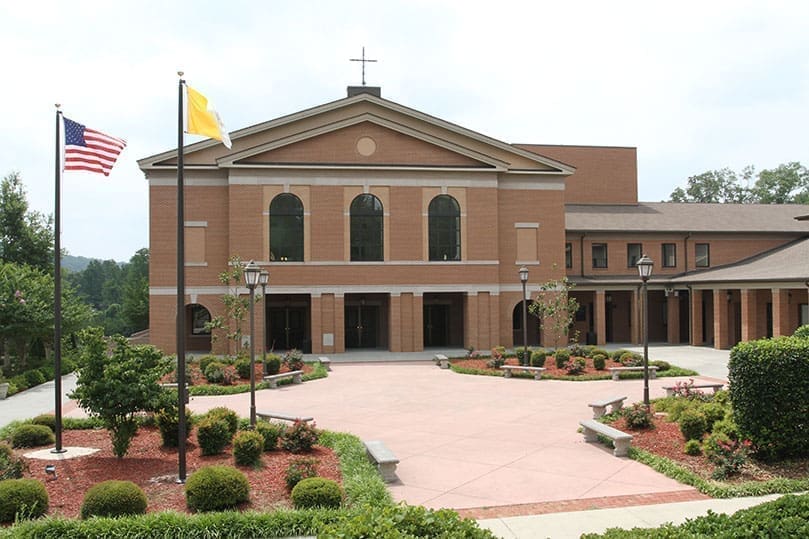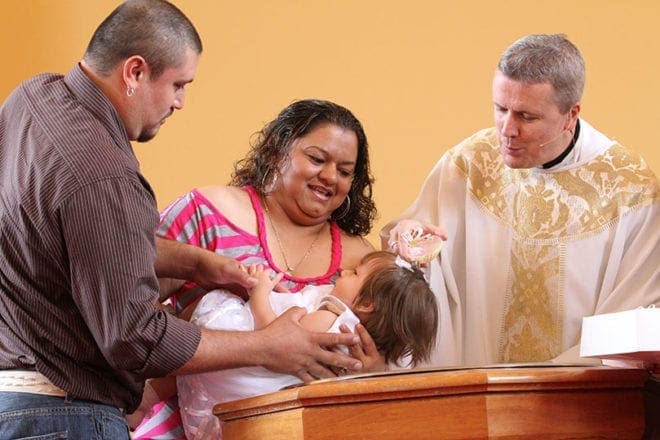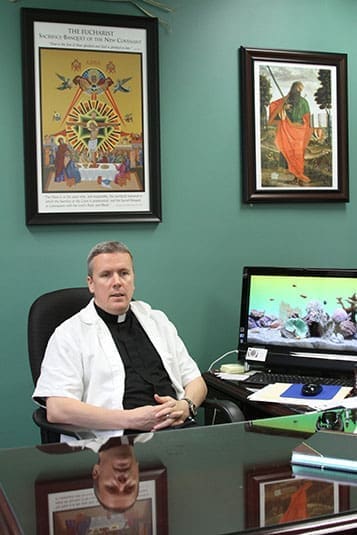 Photo By Michael Alexander
Photo By Michael AlexanderDalton
Worry Spreads In Georgia’s Immigrant Community
By ANDREW NELSON, Staff Writer | Published July 21, 2011
Latin rhythms played by the two guitarists, a drummer and three women singers spilled out of the parish hall at St. Joseph Church.
Hundreds of women, men and children swayed, raised their hands in prayer and danced to the loud, upbeat music.
“This is my life. It’s my fuel,” said Roxana Quezada, 25, who works as a licensed practical nurse and is a mother of one with a second child on the way.
“This is our strength” to deal with the tense atmosphere surrounding immigration issues in this community. “We know God is here for us,” said Quezada, a former illegal immigrant who is now a naturalized American.
A drop in Mass attendance, divisions in the faith community, fear: that’s the situation facing Catholics in northwest Georgia as they confront the tough new state immigration law. Pastors are seeing their Hispanic parishioners wrestle with its impact.
“They were outgrowing (the parish hall), but the state of Georgia has taken care of our growth problem,” said the pastor of the church, Father Paul Williams, about the weekly Hispanic prayer group.
His concern about the ramifications of the new law made him cancel a fall multi-parish prayer service previously held at the local civic center. He shut down the idea out of concern drivers may be detained at police roadblocks.
New Immigration Law In Place
On July 1, the bill with the title of “Illegal Immigration Reform and Enforcement Act of 2011” became law. It’s perhaps better known as HB 87.
A federal judge in Atlanta granted preliminary injunctions blocking two sections of the measure from taking effect. But otherwise 21 provisions of the law remain in place.
U.S. District Court Judge Thomas Thrash Jr. stopped the provision that would have penalized people who knowingly transport or harbor illegal immigrants. He also blocked a section authorizing law enforcement officers to check the immigration status of people suspected of a crime who could not produce proper documents.
Georgia is appealing the court’s decision. Supporters of the HB 87 law say the state is forced to confront the immigration issue because the federal government is ignoring the problem.
Meanwhile, the law still requires employers, on a phased-in basis over the next two years, to verify a potential employee’s legal residency status using a federal government database, among other mandates.
In The Top 10
Georgia ranks in the top 10 states for illegal immigrants, according to the Pew Center for Hispanics. The number peaked a few years ago and has declined as the economy slipped, according to the most recent Pew report. In 2010, the number of illegal Hispanic immigrants was 425,000. That is down from 457,000 estimated in 2007. But it is a jump from 250,000 a decade ago.
At the same time, the Hispanic community also increased the numbers of Catholics in the Atlanta Archdiocese. With an estimated 1 million members in 69 counties, nearly half of the archdiocese is believed to be Hispanic.
In a conference room at St. Joseph Church, the music can be heard through the closed door.
Yolanda Reyes, 55, is a machine operator at a local carpet company. She has on a yellow sweater with matching hoop earrings. Her husband, Mario, is a leader of the prayer group. He wears wire-framed glasses and his dark hair is turning gray at the temples. He is 58. They have worshipped at St. Joseph Church for 14 years. She and her husband became citizens before the 2008 election so they could vote for President Obama.

Godparents Eduardo and Marivel Zavala hold one-year-old Melissa Nunez over the baptismal font during her July 9 baptism at St. Joseph Church, Dalton, by pastor Father Paul Williams, Jr. Photo By Michael Alexander
“We all come from God. We are all one,” she said. “This country for me was a very Christian country. They have forgotten that. All they see in me is bad. They are starting to see us as animals.”
People aren’t interested in taking away jobs from Americans but “to better themselves and their family. They came here to work,” she said. She counted a handful of families she knows who have moved out of Georgia out of fear of the law.
Mario has seen the prayer group shrink quickly. The former teacher said attendance on Friday has dropped by some 30 percent.
“We couldn’t seat everybody. Now it’s full, but we can seat everybody,” he said.
America is a place for people to be free and for people to pursue their happiness, he said.
“This is a country made of immigrant people who have made a better country,” he said.
Church Advocates
The bishops of Georgia have been outspoken on immigrant rights, issuing two letters of support in the past five years.
The Catholic spiritual leaders urged the community to support “comprehensive, federal immigration reform legislation consistent with the values of faith and family that we profess.”
Their March letter was issued as Georgia legislators debated the new immigration law.
“We recognize that some people may have entered the United States in violation of border crossing laws and that certain individuals have overstayed their visas. However, these people do not deserve harsh treatment as major criminals. As pastors, we find it unacceptable that children are separated from their parents and families, or begin each morning wondering if this is the last day they will see their mother or father or siblings,” stated the pastoral letter. Atlanta Archbishop Wilton D. Gregory, Savannah Bishop J. Kevin Boland and Atlanta Auxiliary Bishop Luis R. Zarama signed it.
However, legislators passed the bill over the objections of the leaders in the faith community, business interests and the agriculture industry.
The legislative action in Georgia is part of a national trend. According to the National Conference of State Legislatures, in early 2011, lawmakers across the country and Puerto Rico introduced 1,538 bills and resolutions relating to immigrants and refugees, a jump of nearly 400 proposed laws during the same time in 2010.
From The Pastors’ View
Pastors who work in communities along Interstate 75 find themselves facing the complexity of illegal immigration in their parishes as they balance preaching the church’s message to a sometimes divided community, understanding the needs of people in the parish and building bridges to shore up unity.
Interstate 75 from the edge of Atlanta runs nearly 100 miles to the Tennessee state line. There are some 853,689 Hispanics counted statewide in the 2010 census. Nearly 134,000 Hispanics make their home in the counties cut by the highway.
Father Williams spent Saturday, July 9, baptizing 31 babies in a Spanish-language celebration. That baptismal class size isn’t uncommon at St. Joseph’s in Dalton. Some 600 babies are welcomed in the church a year at the parish that is 90 percent Hispanic, he said.
Church membership increased during his two years in Dalton, where outside the church doors is a large shrine to Our Lady of Guadalupe. The growth has been reversed since the passage of HB 87, he said. He said the parish, the lone Catholic church in Whitfield County, is seeing about 400 fewer people at the largest Sunday Mass since the spring.

During a recent interview in his parish office, Father Paul Williams, Jr., pastor of St. Joseph Church, Dalton, discusses how the state’s new immigration law is impacting his Hispanic parishioners and the parish. Photo By Michael Alexander
Other pastors along the I-75 corridor in northwest Georgia said summer makes it difficult to be certain if people have left the parish for good or are away for a typical seasonal getaway.
Twenty miles south of Dalton, Father Joseph Shaute leads St. Clement Church in Calhoun. He said he’s heard of a handful of families leaving the area but said the picture won’t become clear until the school year begins.
At a recent Mass, the usual 30 extra chairs set out for an overflow congregation went unused, but then again he recently attended a wedding party and a baptism celebration, and both had more than 500 Hispanic party-goers, he said.
Further south in Cartersville, Father Dan Stack said he’s seen little change in the number of people in the pews at St. Francis of Assisi Church. At weekend Masses, he’ll see as many as 500 people at the Spanish Masses.
St. Francis of Assisi Church is about 50 percent Hispanic, and this community adds youthfulness to the church as some 90 percent of adults younger than 25 are Hispanic, he said.
Preaching To The Community
Father Stack said he’s not preached strictly about immigration. Instead, he said he has focused homilies on how laws have unintended consequences.
The community may see the unintended consequences of HB 87 when businesses are short of laborers, apartments go unrented, or schools receive less reimbursement because student enrollment numbers have dropped, Father Stack said.
Father Shaute said he treats the immigration issue by stressing the call for love of neighbor. In the past, Father Shaute said he’d felt a backlash from some congregation members when they didn’t like his homilies on immigrants or election-related issues. And he said during Spanish Mass, he’ll offer prayers for justice and words of compassion.
His common theme is “unity and family,” which has helped build bridges, said Father Shaute.
“I would rather work on changing attitudes than addressing the issue directly, as changing attitudes will lead to changes in treatment of people here and eventually changing people’s actions and voting patterns,” he wrote in an e-mail. He also uses a column to the community in his parish bulletin to get the message out, encouraging people, for example, to write their representatives.
Two days after HB 87 went into effect, Father Williams preached a homily on “the heavy yoke placed on immigrants.”
“If we are to imitate Christ, we must view the world with his eyes,” he said. “Have compassion on the crowds—the ‘little ones,’ the poor, the widow, the orphan, the stranger, the ‘least of his brothers.’”
“The religion of Jesus is not one which imposes impossible burdens on others but seeks to make the ones people do carry light and easy, and not to add burdens which are unjust, capricious, and as Archbishop Gregory has said, ‘mean-spirited,’” said Father Williams, who has spoken from a faith perspective on behalf of immigrants’ rights in the media around Dalton since HB 87 was adopted.
‘Felt Free’
During the week, Juan Andres works making cardboard boxes. The middle child of three boys, he said his family came into the United States when he was a teen by crossing the Arizona desert guided by a “coyote,” a smuggler who brings people into the country.
They left a poor community in Guatemala where his mother sold clothing on the street eight years ago. Now 23, Andres, with dark hair and an embroidered white button-down shirt, said being in the United States “felt free. Now, I feel like a criminal. I don’t feel free.”
In the spring, the family left Georgia because of the impending law for opportunities in Illinois. He returned despite the risk.
“I missed home. I am familiar with the area,” he said in Spanish.
Mirella Villafuerte, 20, is on summer break from studying to be a nurse. A native of Mexico, her father participated in the immigration amnesty program offered in the 1980s. The family stayed apart for eight years before the documents were approved, and she joined him.
Villafuerte reads from the Bible at the 4 p.m. Sunday Mass in Dalton, which is celebrated in English and Spanish.
“Every Mass was packed. It used to be,” she said. While reading to the community, Villafuerte said, “Not even half the temple is filled up.”